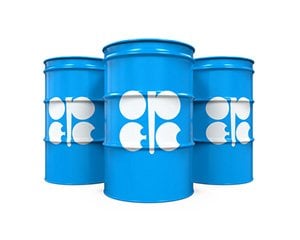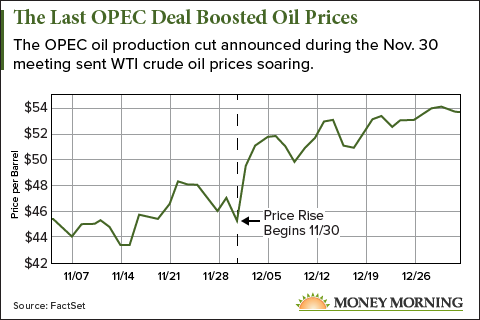The next OPEC meeting is on May 25, 2017, and the fate of the cartel's oil production cap is at stake, making this the most important meeting since 2014.
Meeting in Vienna, OPEC has to decide whether it will keep a lid on oil production or let its members produce as much as they want. Right now, the cartel has limited production to 32.5 million barrels a day in an attempt to boost prices.
Whatever decision OPEC reaches on May 25 will have a dramatic impact on crude oil prices.

Crude oil prices have plunged 5% since the start of the year. WTI crude oil now trades at $46.45 a barrel, its lowest point in 2017. If OPEC extends its cut, oil prices could rise again. But if OPEC fails to renew its production cut, oil prices could fall even lower.
We're going to break down the May OPEC meeting so you can be prepared for what it will do to oil prices, because this could be its most decisive meeting for oil prices since 2014...
Why the Next OPEC Meeting Is So Important for Prices
Like any other commodity, the law of supply and demand dictates oil prices, and OPEC is the only organization that can manage the supply of oil.
Trending Now: Investing in Oil has Double-Digit Profit Potential in 2017
OPEC is an organization of 13 oil-exporting companies who agree to manage oil production together. OPEC collectively decides how much oil to produce to manage oil prices, thus helping its oil-exporting members. The cartel can cut oil production to boost oil prices - making its exports more valuable - or it can cap production to ensure price stability.
On Nov. 30, 2016, OPEC reached its first deal to cut oil production since 2008. The deal cut oil production from OPEC members by 1.2 million barrels a day. The cartel also got the help of 11 other non-member countries, including Russia, to cut another 600,000 barrels of oil a day. The November OPEC deal sent oil prices soaring.

Between Nov. 30 and the end of the year, crude oil prices surged 16%. This was the most significant OPEC decision since November 2014, when the cartel chose not to cap production despite falling prices. Oil prices slid 55% between December 2014 and January 2016.
But higher oil prices encouraged more American oil production. Unlike OPEC countries, firms in the United States are free to produce as much oil as the market dictates.
Higher oil prices mean American oil producers can make a bigger profit, so they produce more oil. When prices climb, more difficult to reach (and expensive) oil becomes profitable. In fact, American oil production has risen 7% since OPEC announced its last deal.
Since oil prices hit $53 a barrel on April 11, oil traders have pushed prices down as a steady barrage of data shows American production rising. For example, the last Baker Hughes rig count on April 28 showed the United States added 13 oil rigs, bringing the number of active rigs up to 697, its highest total in over two years. Oil prices have fallen 8% since the last rig count came out.
With the American production boost pushing oil prices lower, OPEC has to decide if it's willing to keep sacrificing its output in favor of higher oil prices.
If OPEC scuttles the deal, oil prices could plunge, and if it renews it, oil prices could rise again. With oil prices trading near where they were on Nov. 30, this deal is even more important than the original one. If OPEC can't stick to a production cut long enough to keep oil prices up, then the cartel only proves it is useless.
With the stakes so high, here's what to expect at the next OPEC meeting. Plus, we've included our oil price target for the rest of 2017...
Will OPEC Reach a Deal?
[mmpazkzone name="end-story-hostage" network="9794" site="307044" id="138536" type="4"]
We're cautiously optimistic OPEC will agree to cap production, though there is plenty of uncertainty. Our optimism is tempered by two obstacles.
First, OPEC needs non-members like Russia to participate. Russia wavered until the last minute ahead of the Nov. 30 agreement, and it's been the slowest to reduce its production since the agreement began on Jan. 1.
Second, OPEC members need money.
OPEC's production cut agreements help boost oil prices in the long term, but the countries are hurt in the short term. When oil prices are low, the only option for oil-exporting countries that need money is to produce more oil. An oil production cut means they can't do this and simply have to wait for prices to rise.
Countries like Iraq, Iran, Libya, and even Saudi Arabia need revenue from oil production.
Iraq and Libya have both suffered catastrophic damage due to ongoing conflicts, and they are desperate for money. Similarly, Iran suffered under Western sanctions until last year and is eager to recoup its losses through new oil exports. Nearly 90% of Saudi Arabia's revenue comes from oil sales, and with oil prices below $50 a barrel, it may face insolvency in as soon as three years.
But while OPEC members may not like capping their oil production, raising oil prices is a more important goal than short-term sales. That's why OPEC is likely to renew the deal.
Khalid Al-Falih, the Saudi oil minister and one of the most influential figures in OPEC, told Bloomberg in March there is a "strong willingness" to renew the production cut. With oil prices sinking, there's even more incentive for an extension.
That sentiment with OPEC's biggest oil producer has remained unchanged. Today (May 5), Saudi OPEC governor Adeeb Al-Aama told Reuters that OPEC is nearing a consensus on the deal.
"There's an emerging consensus among participating countries on the need to extend the production agreement reached last year," said Adeeb Al-Aama.
That consensus includes non-OPEC member Russia, which has been meeting with Saudi Arabia ahead of the meeting. Reuters is reporting the Russian representative to OPEC said Russia is in favor of continuing the production cuts.
If OPEC renews its deal, we expect oil prices to hit the mid-$50s per barrel by the end of June.
Up Next: One gallon of this new "crystal fuel" could get you from New York to L.A. and back... seven times! Being hailed by many experts as energy's "Holy Grail," it's 1,693 times more powerful than the gasoline that runs your car. The mainstream investment media isn't even talking about it yet. Read more...
Follow Money Morning on Twitter @moneymorning, Facebook, and LinkedIn.


